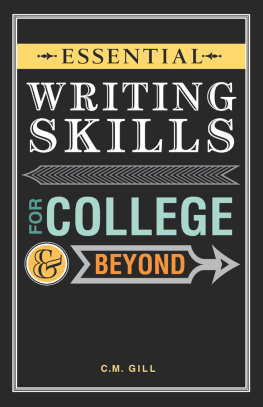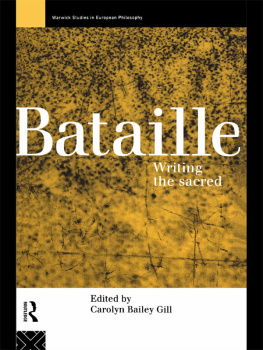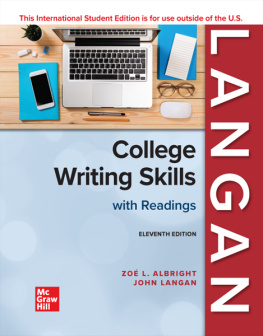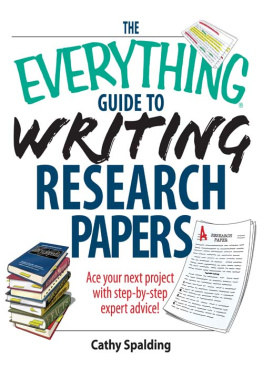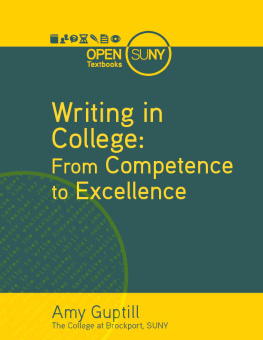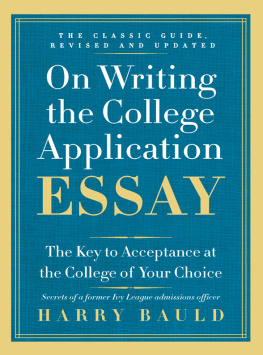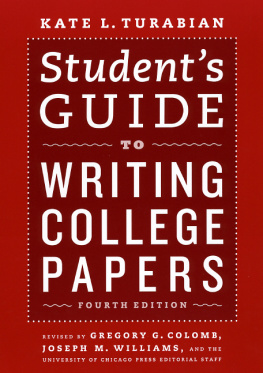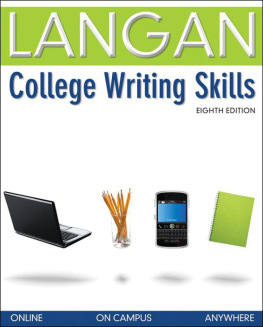ESSENTIAL WRITING SKILLS
FOR
COLLEGE & BEYOND
C.M. GILL

Acknowledgments
I would like to express my gratitude to those who helped bring this book to fruition, especially my students, who inspired the idea for it: Thank you for your dedication to writing and learning and for making my work feel not at all like work.
To the many teachers who taught me to write, to think, and to learn, without whom this book would not exist: Thank you Mrs. Hall, Mrs. Watson, Mr. Quisenberry, Mr. Proctor, Dr. Cohen, Professor Rosenberg, Professor Beebe. Special thanks to Professor Robin Gallaher Branch for reinvigorating in this disinterested, brash freshman writing student her love for literature, writing, and teaching. It carried me far and remains in me still. Thank you.
I owe a particular debt of gratitude to Professor Nancy Wilson, one of the best teachers and writers with whom I have ever had the pleasure to work and learn.
To my colleagues and friends for supporting and encouraging me to persevere: Thank you Katherine Dowdy, Patricia Hernandez, Nadine Cooper-Kohn, and Deloris Collins.
Thank you to Austin Community College, EBSCO, and Innovative Interfaces for the use of their screenshots.
Special thanks and humble gratitude to my friend David for your time, insights, and advice on the text. This would be a different and much less valuable book without your help.
To Thomas, who listened to me blather on about this book, and to many others: Thank you for your sympathetic ears, your patience, your belief in me, and your unyielding support and encouragement.
Thank you to my friend and sister, Kim; my father and teacher, Charles; my uncle, Larry; and my wonderfully stellar but growing-up-much-too-quickly nephews Tyler, Alex, Dylan, and Silas for supporting me during this and all other endeavors always and without question. And thank you to my mother, Robin, who is always my first, loudest, and greatest supporter; I couldnt have written any of this without you. Thank you for always being there and never giving up on me.
About the Author
C.M. Gill has taught academic writing courses for over ten years in both university and community college environments. She has published, presented, and won awards for her own academic work at national and international conferences and currently works as the college and career readiness coordinator for Austin Community College in Austin, Texas.
Contents
Foreword
This book began in my university writing classes. My students complained about their enormous, all-inclusive writing manual. They felt intimidated and overwhelmed by it, and they asked instead for a concise, easy-to-understand guide to the college writing process. This book is that guide. The organization will take you through the writing processfrom generating ideas to polishing the final product.
The value of mastering this process simply cannot be overestimated. In college, almost all assessment is written. Professors in every discipline test students ability not only to learn the material but also to demonstrate this knowledge in writing. Aside from the major papers assigned, college professors also require in-class essays, book reviews, and chapter summaries, and even multiple-choice exams include short-answer and essay questions designed to test writing skills. In fact, as a college student, you can expect to write thousands, if not millions, of words in your undergraduate career. Strong writing skills are also crucial in the professional world. Businesses, governments, and organizations of all kinds highly value those rare people who possess the skills and knowledge to communicate effectively in writing. Clearly, investing in improving your writing skills is not only a good idea; its crucial.
This book will empower you with a strong knowledge of the college writing process and fill any gaps within your knowledge of spelling, grammar, or punctuation. Feel free to use the book as you see fit; skip ahead to access the material you feel you most need, or read the book cover to cover. As with anything else, practice will improve your abilities, so write as much and as often as you can. If you would like more practice than is offered within the pages of this book, you can access additional practice quizzes and student examples for free online at www.writersdigest.com/essential-college-writing.
Best of luck to you, and happy writing!
Introduction
UNDERSTANDING ACADEMIA
Youve probably heard people refer to the college campus as The Ivory Tower. This is, in some ways, an accurate description of the world and people you will encounter in college. The atmosphere is one of idealism, of the pursuit of knowledge, and of the quest for higher ideals. Mundane, practical matters hold significantly less importance here than in, say, the business world. In academia, the dollar is not paramount, nor is physical appearance, and markers of status, such as expensive clothing, accessories, and various other products, are not essential to success.
In academia, there is a purposeful disconnect from the so-called everyday world, especially in the departments of the humanities (psychology, English, philosophy, music, theater, and so on). In fact, the pursuit of higher knowledge requires this disconnect because it requires you to take on a different mindset than the one in the current mainstream or everyday world.
It is important that you begin to cultivate and understand this mind-set. Why? The people and texts you will encounter in your college career will probably be unlike any you have ever encountered, and it can be disorienting if you feel unsure about your role as a student and the purpose of your work. However, this world is not as difficult to navigate as you may think, for it has but one central principle at its core, and once you understand that principle, you can and will excel in academia.
What is this central principle? Consider for a moment why college professors become college professors (instead of, say, accountants or lawyers or dentists). All professors were once college students, and most remained in academia because they fell in love with the search for knowledge, the inquiry into what is known and true, and the desire to find definitive answers. They remain there because they want to continue this quest and meet and work with others who share that goal.
Keep this point in mind as you write your papers and attend your courses because it illustrates the central principle of academia and the base on which it is built: the quest for knowledge.
If you think this principle of the quest for knowledge sounds high-minded and philosophical, youre right; it is. However, it is also a factand if you remember and apply it, you will succeed in college. To be successful in college means to reflect in your work this desire toknow and to prove.
Remember, academics value, above all, knowledge. Professors seek to examine, to learn, to explain, and to know. They have dedicated their lives not to the pursuit of money, fame, or prestige but rather to the pursuit of knowledge, and they expect their students to seek and present such knowledge as well.
The best way to impress an academic is to illustrate that you understand and respect this principle and that you, too, seek higher, deeper knowledge.
How do you go about doing that?

